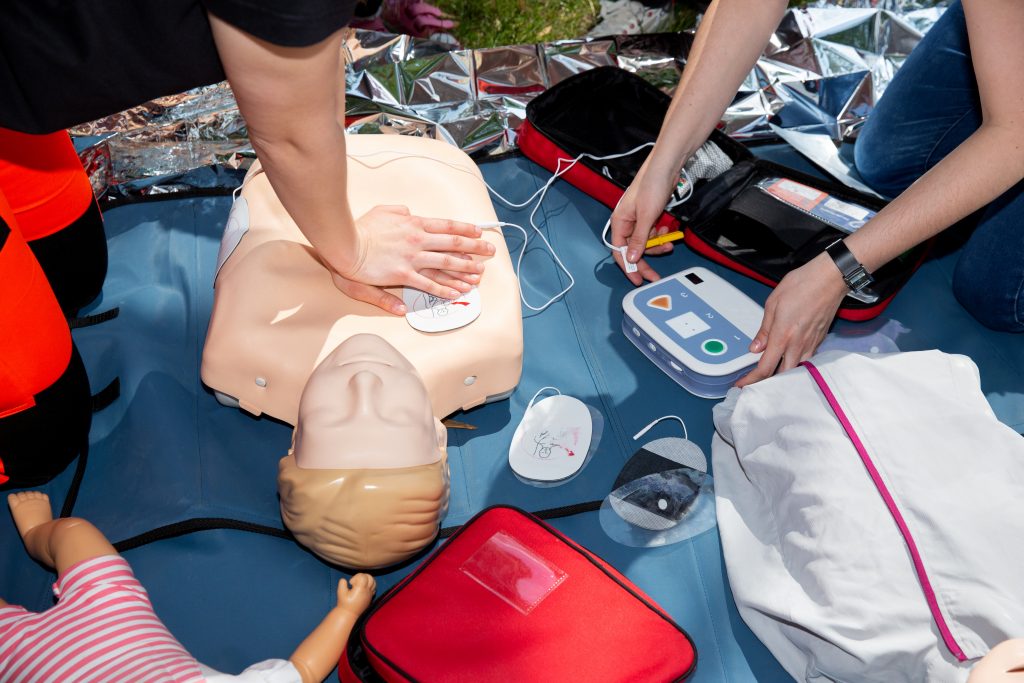How To Keep Yourself Prepared In Case Of A Medical Emergency
Unfortunately, there’s no way to predict when catastrophe may hit your life. Things happen so swiftly that people are powerless to prevent them from happening. Because of how rapid live moves, it’s vital to prepare for any emergency at all times.
If you want to prepare as best as possible for medical emergencies, the following steps and tips will help you respond better to accidents, injuries, and other health emergencies.
- Maintain Quick And Straightforward Access To Critical Information
In an emergency, it’s essential to have access to the medical information on hand. The following are examples of critical information to be aware of:
- Location and Number Of The Nearest Hospital
It’s impossible to spend time reading maps or conducting Google maps searches when a person has to see a doctor as soon as possible. The ability to be quick and easy when getting into your car and driving away is crucial.
If you have a lousy recall for directions and constantly rely on a GPS, it’s a good idea to add the local hospital to your favorites list so you can get to it quickly in case of an emergency. Along with the location, you should also have the contact number of your hospital’s emergency department for a quicker response time.
- Historical Records And Documents
It’s a good idea to keep crucial individual and monetary documents in a waterproof container that’s easy to transport. Each family member should have a copy of everyone’s personal identity card, like a Social Security card, insurance cards, and any medical order papers (DNR forms).
- A Comprehensive List Of Prescription Medications
Maintain an up-to-date list of all of your loved one’s medications, as well as pharmacy phone numbers so you’ll always be aware of what medication they require daily.
- List Of Contacts
To guarantee the safety of your loved one, it’s critical to keep an up-to-date list of all of their contacts, including doctors and other caretakers. Inquire whether your family members’ medical condition has been registered with their local emergency medical services. Doing so will expedite the response time.
Always have a hard copy of your files on hand in case of an emergency. You should also have one at your residence where you’ll have easy access to it in case of an accident. If you like to handle your medical data digitally, it’s best to utilize mobile applications to help you do so. If this isn’t practicable, you need to have a printed copy on hand.
- Prepare An Emergency Kit
It’s necessary to put together a self-contained emergency kit. To survive in an emergency, several critical items are required. It’s preferable to keep these belongings close to the front entrance in a closet or duffel bag, a dolly, or a wheeled container rather than in an inconvenient location.
You should include the following items in your disaster preparedness bag:
- First Aid Manual
If you’re not familiar with how to use the other tools in the box, the value of the other tools will be diminished as a result. If you follow the instructions to the letter, you’ll be prepared for a variety of situations.
- Gloves Made Of Rubber That Have Been Washed And Sterilized
Designed with a germ-free barrier, gloves give an additional layer of protection between the victim and the rescuer when dealing with open wounds or minor injuries. It’s recommended that latex-free gloves be worn by anyone allergic to latex, especially those at risk of anaphylaxis when handling latex-containing materials.
- Adhesive Tape And Gauze
When it comes to putting a halt to the bleeding, this pair collaborates. Apply hard but moderate pressure to a bleeding injury with sterile gauze to stop the bleeding. Then, apply the bandage and tighten it around the wound to help stop the bleeding.
- Ointment Containing Antibiotics
After cleansing a cut or scrape, apply an antibiotic ointment to help prevent infection. Additionally, it can aid in the acceleration of the healing process and the reduction of scarring. Many individuals opt for elastic bandage wraps because they’re both inexpensive and highly effective.
While minimizing swelling, these elastic bandages can support and stabilize injuries to the wrist, elbow, ankle, and knee joints.
- Analgesics
These three treatments, referred to as anti-inflammatory medications, can treat a sore throat or a headache. Aspirin is a highly efficient medication for heart attacks, but you should only use it under the supervision of a medical professional; follow the instructions provided by your doctor to the letter.
Don’t give aspirin to children and you shouldn’t use it to treat flu symptoms in anybody under the age of 18. Also, regularly check the expiration dates on all of your prescriptions to ensure that they’re still in good condition.
- Ice Packets
A cold compress applied rapidly to the affected area can alleviate the pain and swelling of insect stings, sprains, and strains.
- Necessary Contact Information
As critical as bandages, wraps, and ointments are, your doctor’s office, pharmacy, and local poison control center are equally important. If you don’t have access to 911, make a list of the phone numbers for the local ambulance, fire department, and police department.
- Prescription Drug
Like insulin, you should store asthma inhalers, heart drugs, and allergy treatments according to the instructions provided by the manufacturer in the packaging. Ascertain that each family member has a complete list of allergies as well as a current medication list.
- Check Your Insurance Coverage
If you cannot work for an extended period due to a medical emergency, you could incur significant medical bills. If you become disabled due to your illness, you could end up spending thousands of dollars every month in a long-term care home.
An insufficient amount of insurance to cover these unforeseeable events could result in a complete financial catastrophe. Make sure you’re familiar with your insurance coverage so that you can keep track of how well it’s taking care of you and your loved ones. Aside from health insurance with a deductible, long-term care, and life insurance plans, you and your family will require the following:
- Carrying insurance cards at all times is recommended, and hospital staff must verify insurance coverage before administering treatment.
- You may also be able to reduce the amount of time it takes the insurance provider to process your claim when you lower your out-of-pocket payments.
- Establish An Emergency Fund
An emergency fund safeguards you against various threats, not the least of which are medical emergencies. You can lose jobs, shifts cut, rents can be increased, a relocation can occur unexpectedly, and a loved one can die or get ill. Alternatively, a collection of multiple emergencies can occur concurrently.
One of the problems associated with coping with medical emergencies is that they frequently result in family income loss. You’ll likely be unable to work for an extended period and you cannot always count on keeping your job, much less obtaining compensation.
If you don’t have an emergency fund, you should begin by setting aside one month’s worth of living expenses. From there, you may determine the amount of insurance coverage you require for yourself, taking your deductible, health risks, and the stability of your income and expenses into account.
- Keep A Poison Control Center Number On Your Phone
If you or a loved one take a large number of medications, it’s critical to be constantly aware of the risks associated with taking them with other drugs and substances. Everyone, however, makes mistakes. When those errors involve the medications you take and their timing, they can be rather harmful. Thus, ensure that you have the Poison Control Center’s phone number remembered and readily available if something like this occurs.
Never worry about overreacting. It’s their responsibility to be present and assist others in identifying the threats they face. Rather than calling and being assured that everything is alright, the alternative is to forgo calling and risk experiencing catastrophic consequences later.
- Consider Enrolling In CPR Training Or A First Aid Course
As mentioned, since no one knows when a crisis will strike, knowing how to perform basic first aid and cardiopulmonary resuscitation (CPR) will come in handy. While this is valuable information for anybody, caring for the ill or at risk of damage can be especially difficult. Investigate the classes offered in your area to see what you can learn.
The worst dangers associated with an emergency can often be avoided by responding quickly and having everything you need available before the scenario happens. A few minutes of preparing ahead might potentially add years to your life or the life of someone you care about.
- Discuss Medical Alert Systems With Your Loved One
Medical alert systems enable your loved one to request assistance quickly and easily in the case of an emergency, which is especially advantageous if you and your loved one don’t share a residence. Bracelets, watches, wristbands, and necklaces are all popular accessories.
When a family member requires assistance, they can press the device’s button to connect with an experienced dispatcher who’ll notify emergency services or a family member as necessary. Medical alert systems come in various forms–from in-home to mobile devices. Consider your loved one’s needs and behaviors to pick the best gadget for them.
- Provide Access To The Residence
If you live nearby and have access to the home, you can quickly check on your loved one’s well-being, which is especially important if you have concerns about their well-being. However, what happens if emergency services need entry to your home while you’re away?
Emergency responders can always smash the door down, but this will likely be a frightening and costly event for everyone involved. Residents in selected cities can participate in programs that allow them to install a lockbox that emergency services can access. Personal emergency response systems (PERS) are on the market that enables you to provide monitoring workers with a lockbox code, which they can then deliver to first responders.
The majority of senior living communities with on-site security allow residents to authorize specific individuals to access their units. If none of these choices are available, you and your loved one will be forced to choose between handing a key to trusted neighbors or friends, building a lockbox and distributing the code to authorized individuals, or concealing a key on the property.
Keys should never be hidden in plain views, such as above the door frame or beneath the entrance mat. Provide your keys only to a skilled caretaker.
- Familiarize Yourself With The 911 Call Processes
If you happen to be there during a life-threatening event, call 911 immediately. If a third party alerts you to an emergency, request that they hang up and contact 911. Alternatively, you may hang up and dial 911 yourself. Under no circumstances should an older adult who’s gravely ill be brought to the hospital in a private vehicle.
Inform your parent’s doctor about the incident and that your parent is en route to the hospital. Then, you should contact the hospital to confirm that they have the correct name and telephone number for your parent’s physician on file.
When the 911 operator answers the phone, the caller should be prepared to offer the operator the patient’s full name, the complete address of their present location, and the telephone number, or as much of that information as you have access at the time of the call. Additionally, if you have emergency medical information for you or the patient, you should provide the operator with the physician’s name and telephone number.
Finally, inform other family members of the problem. To avoid turmoil and confusion at the emergency department, one family member should be assigned as a liaison with the hospital.
- Keep Your Composure
It’s critical to remember that the caregiver must constantly maintain composure and remain cool regardless of what occurs. When people are under tension and stress, it appears as though they make many erroneous decisions. Never lose your composure or attention when confronted with a medical emergency. This will enable you to initiate the necessary measures to get the situation under control as quickly as possible.
Takeaway
Medical emergencies can strike at any time. That’s why it’s critical to be prepared by following simple rules like keeping emergency contact information on hand, keeping first-aid kits on hand, and, most importantly, maintaining your composure during a medical emergency.
It’s critical to be prepared to care for yourself and your family in the case of an unanticipated catastrophe or tragedy. If you find yourself in a medical emergency, preparation is the best medicine.



